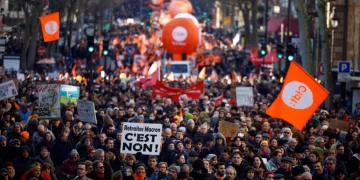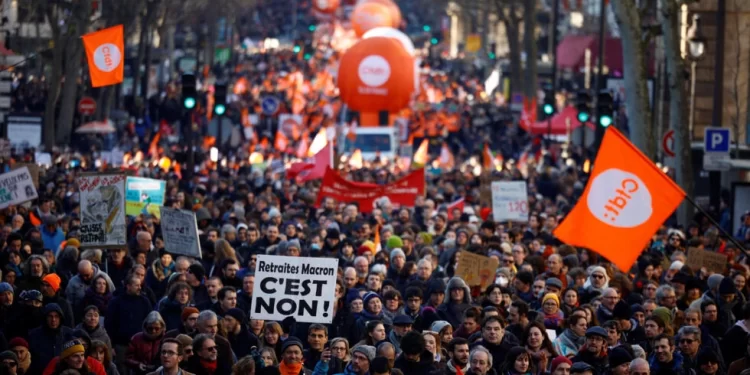PARIS, France – Opponents of France’s controversial pension reform plan sought to keep up the momentum on a third day of protests and strikes, but the numbers taking to the streets were down on the previous week.
President Emmanuel Macron’s bid to raise the retirement age has sparked immense opposition from unions, the left and the wider public, with previous protests on January 19 and 31 sparking mass demonstrations and walkouts.
But turnout was trending downwards on Tuesday with the hardline CGT union saying almost two million people protested nationwide compared with its estimate of 2.8 million last week.
It said 400,000 people were protesting in Paris compared with 500,000 on January 31 and 400,000 on January 19.
The interior ministry is due to publish its own estimates – usually sharply lower than those of the unions – later.
There were isolated clashes in some cities, including Nantes, Paris and Rennes, with police using tear gas against protesters.
Police said that 17 people were arrested in Paris, where bins were set alight, the fronts of McDonalds restaurants smashed as well as glass bottles and other projectiles thrown.
The head of the CGT union, Philippe Martinez, indicated there would be no let up in the fight, warning that more “numerous, massive and rolling” strikes were coming if the government did not drop the pensions plan.
“If the government keeps on refusing to listen then of course things will have to be ratcheted up,” he said.
Macron and retirement age
Macron put raising the retirement age and encouraging the French to work more at the heart of his re-election campaign last year, but polls suggest that two-thirds of people are against the changes.
Parliamentarians began debating the reform, which would see the age for a full pension raised from 62 to 64 and the mandatory number of years of work extended for a full pension, during a stormy session at the National Assembly on Monday.
Labour Minister Olivier Dussopt struggled to make himself heard above loud booing and shouting.
“Here we are, even if you don’t want us to be, here we are,” he said.
“Our (pensions) system is structurally in deficit… Doing nothing is not an option.”
Speaker Yael Braun-Pivet urged lawmakers to keep quiet, telling them: “We’re not at a protest, we’re in the assembly”. The session was suspended on several occasions as debate became impossible.
Left-wing opponents of the administration filed thousands of amendments before the start of the parliamentary debate. This makes a vote on the final text unlikely before the 17 February deadline.
Deficit
Macron made the reform the heart of his re-election campaign last year, and is determined to implement it despite fierce opposition from the political left and unions, but also the wider public.
Macron aims to lift the pensions system out of deficit by 2030 by finding around 18 billion euros of annual savings — mostly from pushing people to work for longer and abolishing some special retirement schemes.
With pressure growing, Borne on Sunday offered a key concession to win support from the conservative Republicans party in parliament.
While the reform will set a new retirement age of 64 for most workers – up from 62 – Borne said people who started work aged 20 or 21 will be allowed to leave work a year earlier.
Calling the offer a “band aid”, the head of the CFDT union Laurent Berger said that the move was not “the response to the huge, geographically and professionally diverse mobilisation” that has swept France.
Largest protests since 2010
Macron’s ruling party lost its overall majority in elections last year, even though it remains the largest faction.
Borne wants to pass the legislation with the help of allies on the political right without having to resort to using clause 49.3 of the constitution – an article which allows the automatic adoption of a law without a vote. Such a move would risk stoking further protests.
Republicans chief Eric Ciotti told newspaper Le Parisien that he would back the reform, potentially securing a majority for the government.
Last week’s demonstrations brought out 1.3 million people across the country, according to the police, while unions claimed more than 2.5 million people took part.
Either way, they were the largest such protests in France since 2010.
Trains and the Paris metro are again expected to see “severe disruptions” on Tuesday, operators said, with around one in five flights at Orly airport south of the capital expected to be cancelled.
‘Playing with fire’
“We’re counting on there being rallies so that the country’s elected representatives take into account the opinion of citizens,” Philippe Martinez, leader of the hard-left CGT union, told the France 2 broadcaster on Monday.
“The President of the Republic is playing with fire,” he said.
In the energy sector, the CGT union claimed that due to strike action that began on Monday, there was a drop of around 4,500 MW in energy production, the equivalent of more than four nuclear reactors.
More than one in two employees (56 percent) of TotalEnergies refineries were on strike on Monday according to management, between 75 and 100 percent depending on the site, according to the CGT.
United against the postponement of the legal age to 64, the eight main French unions (CFDT, CGT, FO, CFE-CGC, CFTC, Unsa, Solidaires, FSU) intend to continue to put pressure on the government, encouraging their members to beat the previous scores for turnout.
With more than 200 rallies planned across the country on Tuesday, a security source told AFP it anticipates anywhere between 900,000 and 1.1 million demonstrators, including around 70,000 in Paris.
To control the crowds, 11,000 police and gendarmes will be mobilised, including 4,000 in the capital.
More marches are planned for Saturday.


















